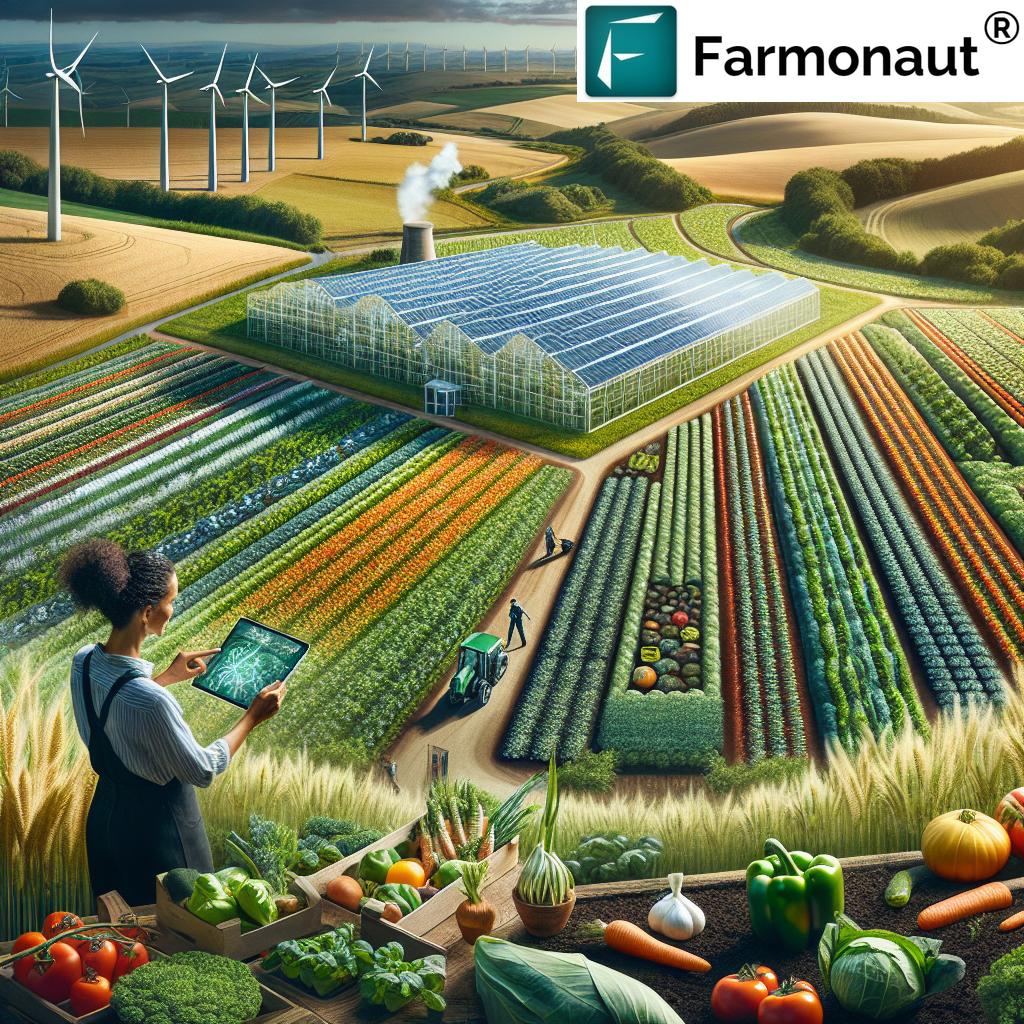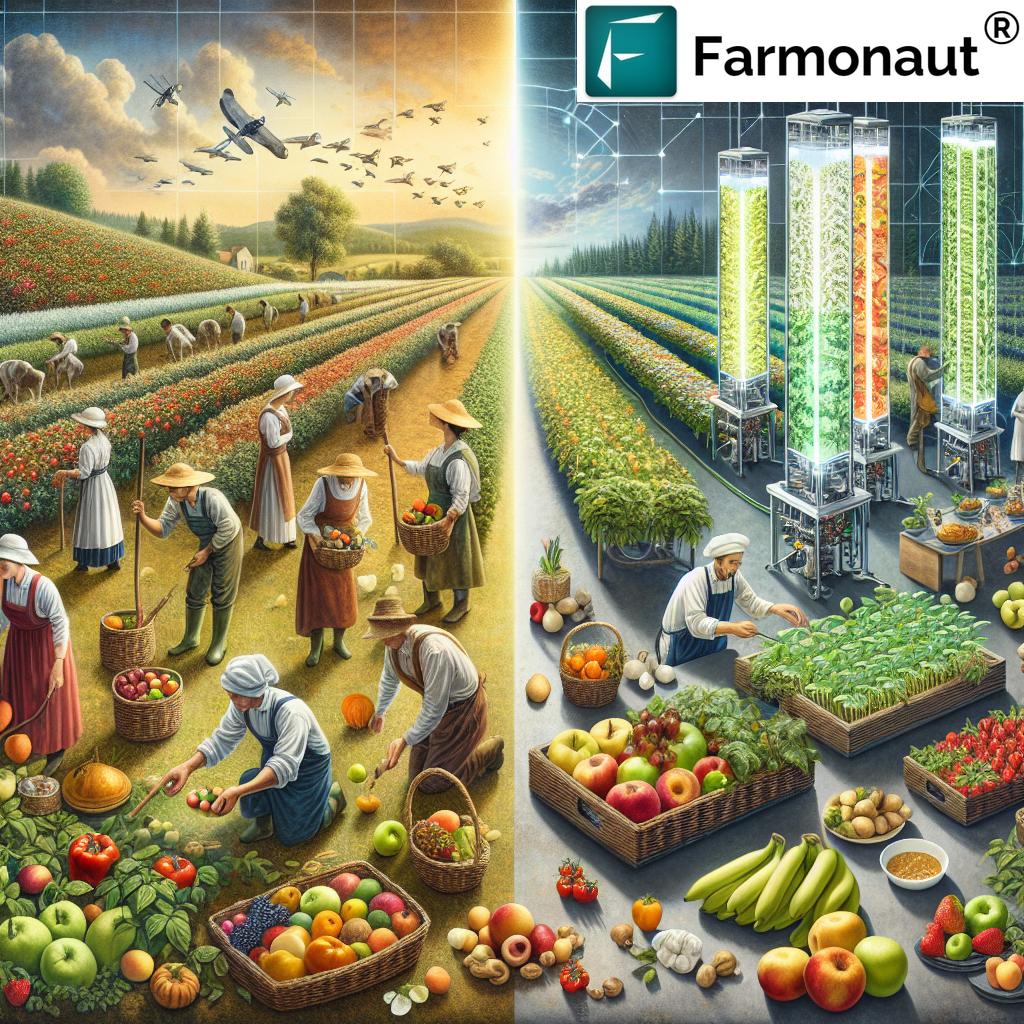Sustainable European Farming: Cultivating Health Through Agricultural Diversity and Balanced Nutrition
“Over 43 million Europeans struggle to afford quality meals, highlighting the need for sustainable agriculture and food security.”
In the vibrant tapestry of European agriculture, we find ourselves at a critical juncture where sustainable farming practices, health, and wellbeing converge. As we delve into the intricate relationship between European farming and the health of its citizens, we uncover a landscape rich with challenges and opportunities. Our journey through this topic will explore how agricultural diversity and balanced nutrition are not just buzzwords, but essential components in cultivating a healthier future for Europe.
The Current State of European Farming and Nutrition
European farming stands as a cornerstone of the continent’s economy and cultural identity. However, it faces significant challenges in meeting the nutritional needs of its population. With over 43 million Europeans struggling to afford quality meals, the imperative for sustainable agriculture in Europe has never been more pressing. This stark reality underscores the vital role that agricultural cooperatives and innovative farming methods play in promoting healthy eating habits and ensuring food security across the continent.

The challenges faced by European farmers are multifaceted, ranging from climate change and resource scarcity to evolving consumer demands for more nutritious and sustainably produced food. These challenges necessitate a paradigm shift in how we approach farming and food production. It’s not just about quantity anymore; the quality and nutritional value of our food have taken center stage in the discourse on public health and agricultural policy.
The Importance of Agricultural Diversity
Agricultural diversity is more than just a catchphrase; it’s a fundamental principle for building resilient and sustainable food systems. By cultivating a wide array of crops and livestock, European farmers can:
- Enhance soil health and biodiversity
- Improve resistance to pests and diseases
- Provide a more varied and nutritious diet for consumers
- Increase economic stability for farming communities
This diversity is crucial in addressing the nutritional challenges faced by European citizens. A varied agricultural landscape translates to a more diverse range of foods available in the market, contributing to balanced diets and improved public health outcomes.
Balanced Nutrition: The Cornerstone of Public Health
“European agricultural policies focus on balanced diets for children and young adults, promoting health through diverse farming practices.”
The importance of a balanced diet cannot be overstated, especially for children and young adults. European agricultural policy has recognized this, placing significant emphasis on promoting diverse farming practices that support nutritional variety. This approach is not just about feeding the population; it’s about nourishing it with the right balance of nutrients essential for optimal health and development.
Key aspects of balanced nutrition supported by European farming include:
- Increased production of fruits and vegetables
- Promotion of whole grains and legumes
- Sustainable livestock practices for lean meats and dairy
- Cultivation of nutrient-dense crops
By aligning agricultural practices with nutritional goals, European farmers are playing a crucial role in public health initiatives, combating issues such as obesity, malnutrition, and diet-related diseases.
The Role of Food Quality Standards
European food quality standards are among the most stringent in the world, serving as a benchmark for safety and nutritional value. These standards not only ensure that the food reaching consumers’ plates is safe but also that it meets certain nutritional criteria. This focus on quality is integral to the broader goal of promoting health through agriculture.
Key elements of European food quality standards include:
- Strict regulations on pesticide use
- Guidelines for organic farming practices
- Nutritional labeling requirements
- Traceability systems for food products
These standards work in tandem with agricultural diversity to ensure that European citizens have access to safe, nutritious, and high-quality food products.
Innovative Solutions in European Farming
As we navigate the challenges of sustainable agriculture and balanced nutrition, innovation plays a pivotal role. Agritech solutions, such as those offered by Farmonaut, are revolutionizing the way European farmers manage their crops and resources. These technologies contribute significantly to addressing the challenges of food security and nutritional quality.
Farmonaut’s satellite-based farm management solutions, for instance, provide farmers with real-time data on crop health, enabling them to make informed decisions that optimize yield and quality. This level of precision in farming not only improves productivity but also ensures that crops receive the care they need to reach their full nutritional potential.
Explore Farmonaut’s innovative solutions:
The Impact of Climate Change on European Agriculture
Climate change poses a significant threat to European agriculture, affecting crop yields, quality, and nutritional content. As temperatures rise and weather patterns become more erratic, farmers face new challenges in maintaining the diversity and nutritional value of their crops. This environmental shift necessitates adaptive strategies and innovative farming methods to ensure food security and nutritional adequacy for European citizens.
Some key impacts of climate change on European agriculture include:
- Altered growing seasons
- Increased frequency of extreme weather events
- Changes in pest and disease patterns
- Water scarcity in some regions
To address these challenges, European farmers are adopting climate-smart agricultural practices, supported by technology and policy initiatives. These adaptations are crucial for maintaining agricultural diversity and ensuring the continued availability of nutritious food options.
The Role of Agricultural Cooperatives in Promoting Health
Agricultural cooperatives play a vital role in the European farming landscape, serving as hubs of innovation, knowledge sharing, and collective action. These cooperatives are instrumental in promoting sustainable agriculture practices and improving access to nutritious food for European citizens.
Key benefits of agricultural cooperatives include:
- Pooling resources for better access to technology and markets
- Sharing knowledge on best practices for sustainable farming
- Collective bargaining power for fair prices
- Promoting local food systems and short supply chains
By fostering collaboration among farmers, cooperatives contribute to the diversity of agricultural products available to consumers, supporting balanced nutrition and food security across Europe.

Sustainable Farming Practices for Nutritional Quality
Sustainable farming practices are not just beneficial for the environment; they also play a crucial role in enhancing the nutritional quality of food products. By focusing on soil health, biodiversity, and resource conservation, European farmers can produce crops and livestock that are richer in essential nutrients.
Some key sustainable farming practices include:
- Crop rotation and intercropping
- Reduced use of synthetic pesticides and fertilizers
- Conservation tillage
- Integrated pest management
- Water conservation techniques
These practices contribute to the production of more nutrient-dense foods, supporting the goal of balanced nutrition for European citizens. Moreover, they help in preserving the long-term fertility and productivity of agricultural lands, ensuring food security for future generations.
The Connection Between Agriculture and Public Health
The link between agriculture and public health is undeniable. The food we produce directly impacts the health and wellbeing of our population. In Europe, where diet-related health issues such as obesity and cardiovascular diseases are on the rise, the role of agriculture in promoting public health has gained increased attention.
Key areas where agriculture influences public health:
- Nutritional content of food products
- Food safety and quality
- Environmental health through sustainable practices
- Economic wellbeing of rural communities
By aligning agricultural policies with public health objectives, European policymakers are working towards creating a food system that not only feeds but nourishes the population, addressing both immediate nutritional needs and long-term health outcomes.
Educating Consumers on Nutrition and Sustainable Food Choices
Education plays a crucial role in bridging the gap between sustainable agriculture and consumer behavior. By informing European citizens about the nutritional value of different foods and the impact of their food choices on both health and the environment, we can foster a culture of conscious consumption that supports sustainable farming practices.
Key aspects of consumer education include:
- Understanding food labels and nutritional information
- Awareness of seasonal and local produce
- Knowledge of sustainable farming practices
- Understanding the link between diet and health
Through educational initiatives, we can empower consumers to make informed decisions that benefit their health while supporting sustainable European farming practices.
The Future of European Agriculture: Balancing Productivity and Nutrition
As we look to the future, the challenge for European agriculture lies in balancing productivity with nutritional quality and sustainability. This balance is crucial for addressing the dual challenges of food security and public health. The integration of innovative technologies, such as those offered by Farmonaut, will play a pivotal role in achieving this balance.
Key areas of focus for the future include:
- Precision agriculture for optimized resource use
- Biofortification of crops for enhanced nutritional value
- Development of resilient crop varieties
- Integration of circular economy principles in farming
By embracing these innovations and maintaining a focus on agricultural diversity and balanced nutrition, European farming can continue to evolve, meeting the nutritional needs of its population while preserving the environment for future generations.
European Agricultural Policy: Shaping the Future of Food and Health
European agricultural policy plays a crucial role in shaping the landscape of farming and food production across the continent. These policies have a direct impact on the types of crops grown, farming methods used, and ultimately, the nutritional quality of food available to consumers.
Key aspects of European agricultural policy include:
- Support for sustainable farming practices
- Incentives for organic farming
- Promotion of rural development
- Regulations on food safety and quality
As these policies continue to evolve, there is an increasing focus on aligning agricultural objectives with public health goals, ensuring that farming not only meets production targets but also contributes to the overall health and wellbeing of European citizens.
The Role of Technology in Enhancing Agricultural Diversity and Nutrition
Technology is playing an increasingly important role in European agriculture, offering solutions that enhance both productivity and nutritional quality. From precision farming techniques to advanced crop breeding methods, technological innovations are helping farmers meet the dual challenges of food security and nutritional adequacy.
Farmonaut’s satellite-based farm management solutions, for instance, provide farmers with valuable insights that can help optimize crop health and yield. By leveraging such technologies, farmers can make data-driven decisions that not only improve productivity but also enhance the nutritional value of their crops.
Explore Farmonaut’s API for developers:
Farmonaut API
API Developer Docs
Addressing Food Waste: A Key to Nutritional Security
Food waste is a significant challenge in Europe, with implications for both food security and environmental sustainability. Addressing this issue is crucial for ensuring that the nutritional benefits of diverse agricultural production reach consumers effectively.
Strategies for reducing food waste include:
- Improving storage and transportation infrastructure
- Educating consumers on food preservation and use
- Encouraging the use of “ugly” produce
- Implementing food recovery and redistribution programs
By reducing food waste, we can ensure that a greater proportion of the nutritious food produced by European farmers reaches consumers, contributing to better health outcomes and more sustainable use of agricultural resources.
The Impact of Urban Agriculture on Nutrition and Health
Urban agriculture is gaining traction across Europe, offering a unique solution to some of the challenges faced in food production and distribution. These urban farming initiatives contribute to agricultural diversity and provide fresh, nutritious produce to city dwellers.
Benefits of urban agriculture include:
- Increased access to fresh, local produce
- Reduced transportation costs and emissions
- Educational opportunities for urban residents
- Improved urban biodiversity
As cities continue to grow, integrating agriculture into urban spaces can play a vital role in promoting balanced nutrition and connecting people with their food sources.
The Role of Research and Innovation in European Agriculture
Continuous research and innovation are crucial for addressing the evolving challenges in European agriculture. From developing more resilient crop varieties to innovating sustainable farming methods, research plays a vital role in shaping the future of agriculture and nutrition in Europe.
Key areas of agricultural research include:
- Climate-resilient crop varieties
- Sustainable pest management techniques
- Soil health and conservation
- Nutritional enhancement of crops
By investing in research and innovation, Europe can stay at the forefront of agricultural advancements, ensuring a sustainable and nutritious food supply for its citizens.
European Agricultural Diversity and Nutritional Impact
| Agricultural Product | Key Nutrients | Health Benefits | Sustainability Score (1-10) | Production Volume (estimated tons/year) |
|---|---|---|---|---|
| Organic Vegetables | Vitamins A, C, K, Folate | Improved immune function, heart health | 9 | 15 million |
| Whole Grains | Fiber, B vitamins, Iron | Digestive health, energy production | 8 | 150 million |
| Dairy Products | Calcium, Protein, Vitamin D | Bone health, muscle function | 6 | 160 million |
| Lean Meats | Protein, Iron, Zinc | Muscle growth, cognitive function | 5 | 45 million |
| Legumes | Protein, Fiber, Folate | Heart health, blood sugar regulation | 9 | 5 million |
| Fruits | Vitamins C, A, Antioxidants | Skin health, disease prevention | 8 | 70 million |
Combating Sedentary Lifestyles Through Agricultural Initiatives
While sustainable agriculture and balanced nutrition are crucial for health, physical activity also plays a vital role in overall wellbeing. European agricultural initiatives are increasingly recognizing the importance of combating sedentary lifestyles alongside promoting nutritious diets.
Initiatives to promote physical activity in agricultural settings include:
- Community gardens and urban farming projects
- Farm-to-table programs encouraging local food sourcing
- Agritourism promoting active engagement with farms
- School programs integrating gardening and nutrition education
By combining efforts to promote both balanced nutrition and physical activity, European agricultural initiatives are taking a holistic approach to public health and wellbeing.
The Future of Sustainable European Farming
As we look to the future, sustainable European farming stands at the forefront of addressing global challenges such as climate change, food security, and public health. By embracing agricultural diversity, leveraging innovative technologies, and maintaining a focus on nutritional quality, European farmers and policymakers are paving the way for a healthier, more sustainable future.
Key focus areas for the future include:
- Further integration of technology in farming practices
- Expansion of organic and regenerative agriculture
- Development of more resilient and nutritious crop varieties
- Strengthening the connection between consumers and food producers
Through these efforts, European agriculture can continue to evolve, meeting the nutritional needs of its population while preserving the environment for future generations.
Conclusion
Sustainable European farming, with its focus on agricultural diversity and balanced nutrition, is more than just a method of food production – it’s a pathway to better health and wellbeing for all Europeans. By embracing innovative practices, supporting agricultural cooperatives, and aligning farming with public health goals, we can create a food system that nourishes both people and the planet.
As we face the challenges of climate change, population growth, and evolving nutritional needs, the role of sustainable agriculture in Europe becomes ever more critical. Through continued research, policy support, and technological innovation, European farming can lead the way in cultivating health, ensuring food security, and building a sustainable future for generations to come.
FAQs
- What is sustainable agriculture in Europe?
Sustainable agriculture in Europe refers to farming practices that meet society’s food needs while preserving environmental resources and promoting rural economic viability. - How does agricultural diversity contribute to balanced nutrition?
Agricultural diversity ensures a wide variety of food products, providing a range of nutrients essential for a balanced diet and overall health. - What role do agricultural cooperatives play in European farming?
Agricultural cooperatives in Europe support farmers by pooling resources, sharing knowledge, and improving market access, contributing to more sustainable and diverse farming practices. - How is technology improving sustainable farming in Europe?
Technologies like satellite imaging and AI-driven analytics are helping European farmers optimize resource use, improve crop yields, and enhance the nutritional quality of produce. - What are the main challenges facing European agriculture today?
Key challenges include climate change, resource scarcity, evolving consumer demands, and the need to balance productivity with environmental sustainability and nutritional quality.






